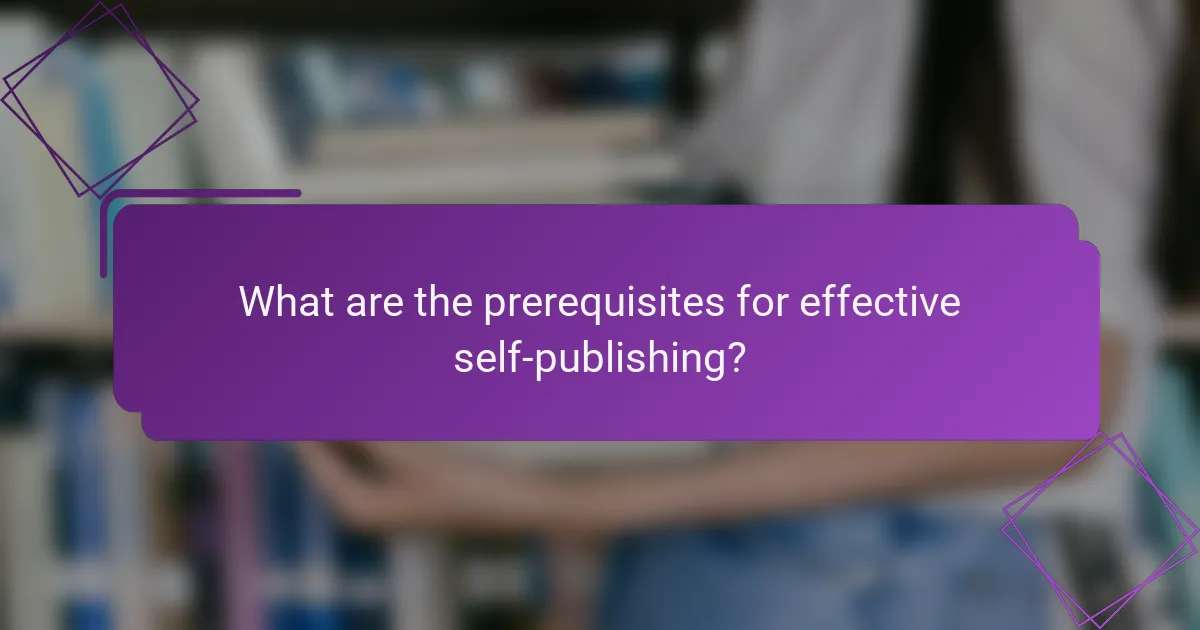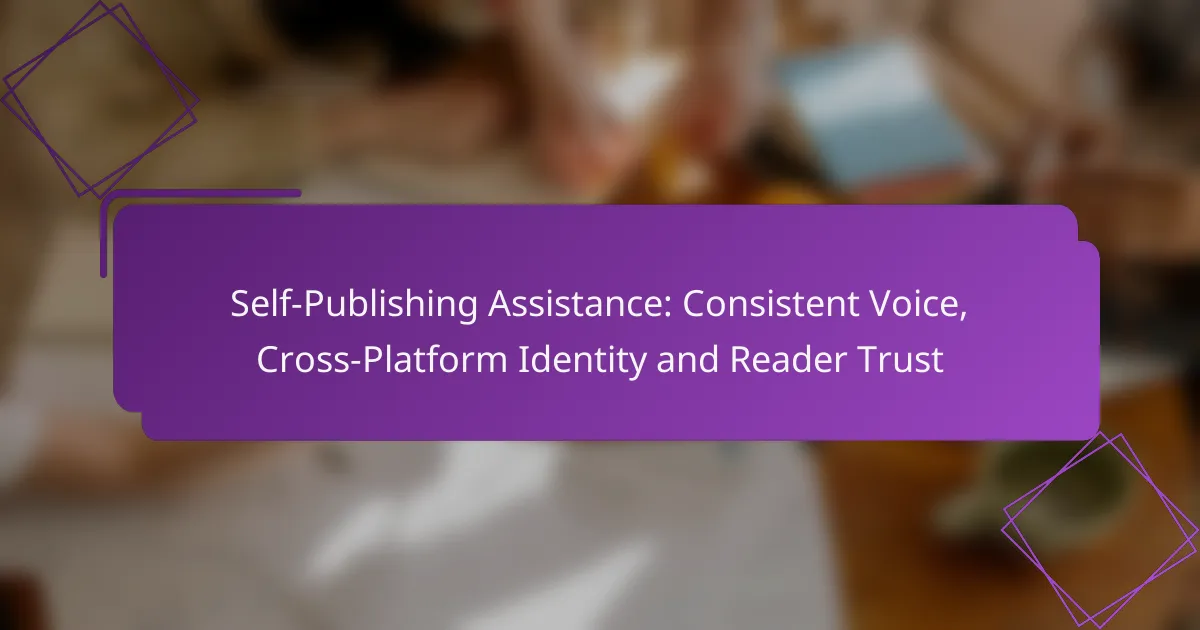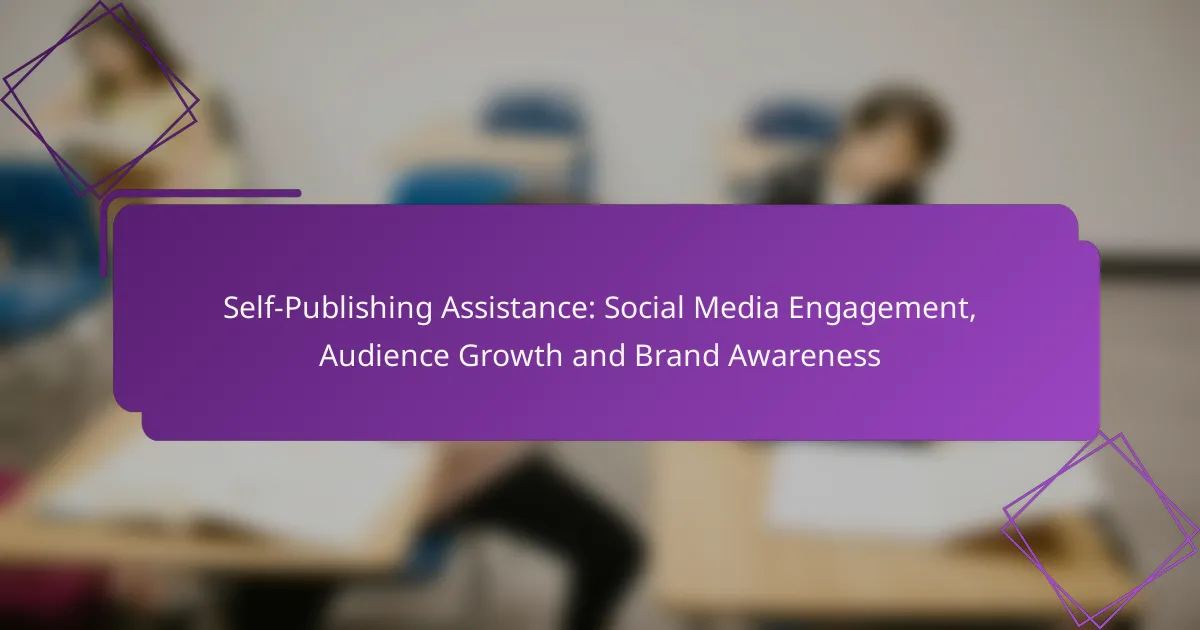In the world of self-publishing, personal branding is essential for authors to stand out and connect with their audience. By developing a strong author identity and employing targeted market positioning strategies, writers can enhance their visibility and drive book sales. Utilizing tools for professional image creation and reader engagement further strengthens their presence in a competitive landscape.

How can personal branding enhance self-publishing success?
Personal branding is crucial for self-publishing success as it helps authors differentiate themselves in a crowded market. A strong personal brand builds trust and recognition, making it easier to connect with readers and drive book sales.
Establishing a unique author identity
Creating a unique author identity involves defining your voice, style, and the themes you want to explore in your writing. Consider what makes your perspective distinct and how you can convey that through your books and promotional materials. This identity should resonate with your target audience and reflect your personal values.
To solidify your author identity, develop a consistent tone across all platforms, including your book covers, social media, and marketing materials. This consistency helps readers recognize your work and fosters a sense of familiarity.
Building a recognizable online presence
A recognizable online presence is essential for attracting and retaining readers. Start by creating profiles on major social media platforms and author-centric sites like Goodreads. Use these platforms to share insights about your writing process, book updates, and personal anecdotes that reflect your author identity.
Regularly engaging with your audience through posts, comments, and shares can enhance your visibility. Aim for a balance between promotional content and personal storytelling to create a relatable image that draws readers in.
Leveraging social media platforms
Social media platforms are powerful tools for self-published authors to connect with their audience. Focus on platforms where your target readers are most active, such as Instagram for visual storytelling or Twitter for quick updates and interactions. Tailor your content to fit the platform’s style and audience preferences.
Utilize features like live videos, polls, and stories to engage your followers. Consistent interaction can lead to a loyal fan base, increasing the likelihood of book sales and word-of-mouth recommendations.
Creating a professional website
A professional website serves as your central hub for all author-related activities. It should include a clean design, easy navigation, and essential information such as your biography, book listings, and contact details. Consider adding a blog to share writing tips, book insights, or personal stories that align with your brand.
Ensure your website is mobile-friendly and optimized for search engines to attract organic traffic. Including a newsletter signup can help you build an email list for direct communication with your readers.
Engaging with readers and communities
Engaging with readers and communities fosters a sense of connection and loyalty. Participate in online forums, book clubs, and social media groups related to your genre. Share your experiences, answer questions, and provide value to these communities without overtly promoting your work.
Consider hosting virtual events, such as Q&A sessions or book readings, to interact directly with your audience. Building relationships with readers can lead to lasting support and increased visibility for your books.

What strategies improve market positioning for self-published authors?
Self-published authors can enhance their market positioning through targeted strategies that focus on understanding their audience, optimizing visibility, and building relationships. By implementing effective marketing techniques, authors can increase their reach and establish a strong presence in the competitive publishing landscape.
Identifying target audience demographics
Understanding target audience demographics is crucial for self-published authors to tailor their content and marketing efforts. This involves analyzing factors such as age, gender, interests, and reading habits to create a reader profile. Tools like surveys, social media insights, and book sales data can help gather this information.
Once demographics are identified, authors can craft targeted marketing messages that resonate with their ideal readers. For instance, a romance author may focus on women aged 25-45, while a young adult fantasy writer might target teens and young adults. Knowing your audience allows for more effective promotional strategies.
Utilizing SEO for book visibility
Search Engine Optimization (SEO) is essential for increasing the visibility of self-published books online. Authors should research relevant keywords that potential readers might use to find their books and incorporate these into their book descriptions, titles, and blog content. Tools like Google Keyword Planner can assist in identifying effective keywords.
Additionally, optimizing metadata and using engaging cover images can improve search rankings on platforms like Amazon. Authors should also consider writing blog posts or articles related to their book topics, which can drive organic traffic and enhance their online presence.
Collaborating with influencers
Collaborating with influencers can significantly boost a self-published author’s visibility and credibility. Influencers with a following that matches the author’s target demographic can help promote the book through reviews, social media posts, or interviews. This partnership can lead to increased exposure and sales.
When seeking influencers, authors should look for individuals who genuinely resonate with their genre and style. Building authentic relationships with these influencers can lead to more impactful promotions. Authors should also consider offering free copies of their books in exchange for honest reviews.
Participating in author events
Participating in author events, such as book fairs, readings, and workshops, provides self-published authors with opportunities to connect with readers and other writers. These events can help authors showcase their work, gain valuable feedback, and network within the literary community.
Authors should actively seek local and virtual events to maximize their reach. Engaging with attendees through discussions and signings can create lasting impressions and encourage word-of-mouth marketing. Additionally, authors can consider hosting their own events to draw attention to their books and brand.

What tools assist in personal branding for authors?
Authors can enhance their personal branding using various tools that help create a professional image, engage with readers, and establish an online presence. Key tools include graphic design platforms, email marketing services, and website builders that facilitate effective communication and promotion of their work.
Canva for graphic design
Canva is a user-friendly graphic design tool that allows authors to create visually appealing marketing materials. With a wide range of templates for social media posts, book covers, and promotional graphics, authors can easily customize designs to fit their brand identity.
When using Canva, focus on maintaining consistency in colors, fonts, and imagery to reinforce your brand. Avoid cluttered designs; instead, opt for clean layouts that highlight your message. Canva offers both free and paid options, making it accessible for authors at different budget levels.
Mailchimp for email marketing
Mailchimp is a popular email marketing platform that helps authors build and manage their mailing lists. By creating targeted campaigns, authors can engage directly with their audience, share updates, and promote new releases effectively.
To maximize your email marketing efforts, segment your audience based on interests or engagement levels. This allows for personalized content that resonates better with readers. Mailchimp offers analytics to track open rates and engagement, helping authors refine their strategies over time.
WordPress for website creation
WordPress is a powerful website creation tool that enables authors to establish a professional online presence. With customizable themes and plugins, authors can create blogs, portfolios, and e-commerce sites to showcase their work and connect with readers.
When setting up a WordPress site, choose a domain name that reflects your author brand and is easy to remember. Regularly update your content to keep readers engaged and improve search engine visibility. Consider using SEO plugins to optimize your site for better discoverability.

What are the prerequisites for effective self-publishing?
Effective self-publishing requires a solid understanding of the publishing landscape, clear author goals, and a well-defined market positioning strategy. These elements help authors navigate the complexities of publishing and successfully reach their target audience.
Understanding the publishing landscape
The publishing landscape has evolved significantly, with various platforms available for self-publishing, including Amazon Kindle Direct Publishing, IngramSpark, and others. Each platform has its own requirements, distribution channels, and royalty structures, making it essential to research and choose the right one for your book.
Consider the differences between eBook and print publishing. eBooks often have lower production costs and quicker turnaround times, while print books may appeal to readers who prefer physical copies. Assessing your target audience’s preferences can guide your decision.
Defining your author goals
Defining clear author goals is crucial for successful self-publishing. Determine whether your primary aim is to generate income, build a readership, or establish yourself as an expert in your field. This clarity will inform your marketing strategies and content creation.
Set specific, measurable objectives, such as selling a certain number of copies within a timeframe or gaining a specific number of followers on social media. Regularly reviewing these goals will help you stay focused and adjust your strategies as needed.

How can authors measure their branding effectiveness?
Authors can measure their branding effectiveness by analyzing various metrics that reflect their visibility and engagement with readers. Key indicators include social media interactions, book sales figures, and customer reviews, which collectively provide insights into how well an author’s brand resonates with their audience.
Analyzing social media engagement
Social media engagement is a crucial metric for authors to assess their branding effectiveness. This includes tracking likes, shares, comments, and follower growth across platforms like Facebook, Instagram, and Twitter. A strong engagement rate, typically above 2-3%, indicates that your content is resonating with your audience.
To effectively analyze social media engagement, consider using tools such as Hootsuite or Buffer, which can provide analytics on post performance. Regularly review which types of content generate the most interaction, and adjust your strategy accordingly to enhance your brand presence.
Tracking book sales and reviews
Book sales and reviews are direct indicators of an author’s market position and branding success. Monitoring sales trends over time can help identify which marketing strategies are effective. Aim to track sales weekly or monthly to spot patterns and adjust your promotional efforts as needed.
Additionally, pay attention to reviews on platforms like Amazon or Goodreads. A higher number of positive reviews can enhance credibility and attract new readers. Consider setting a goal for obtaining reviews, such as aiming for at least 10-20 reviews per book within the first few months of release.

What emerging trends in self-publishing should authors watch?
Authors should pay attention to the rapid growth of digital formats, particularly audiobooks and podcasts, as these mediums are reshaping how readers consume content. Additionally, the importance of personal branding and market positioning is becoming increasingly vital for self-published authors to stand out in a crowded marketplace.
Growth of audiobooks and podcasts
The popularity of audiobooks and podcasts has surged, with many readers and listeners preferring these formats for their convenience. Authors can leverage this trend by creating audio versions of their books or launching related podcasts to engage their audience in new ways.
To successfully enter the audiobook market, consider platforms like Audible or Google Play Books, which offer wide distribution. For podcasts, platforms such as Spotify or Apple Podcasts can help reach potential listeners. Creating engaging content that complements your written work can enhance your brand and attract a broader audience.
When producing audiobooks, ensure high-quality narration and consider professional voice actors if needed. For podcasts, focus on consistent scheduling and compelling topics that resonate with your target audience. Avoid common pitfalls like poor audio quality or infrequent episodes, as these can deter listeners and impact your brand negatively.



